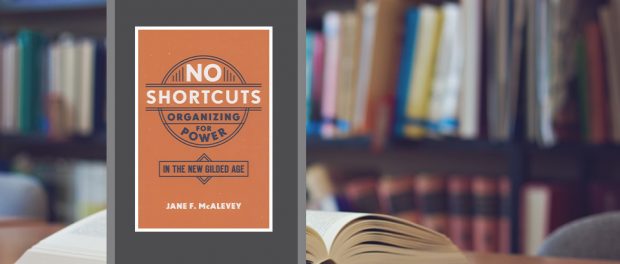No Shortcuts: Organizing for Power in the New Gilded Age
By Jane F. McAlevey

Jane McAlevey does not believe in short cuts, nor does she believe in accidents. In No Shortcuts: Organizing for Power in the New Gilded Age, author Jane McAlevey’s analyzes the dire state of the United States’ societal alienation and inequality. These are not the passive outcome of historical trends but the results of decades-long right-wing planning to limit the power of working people. Only the equally deliberate strategizing and organizing of working people can reverse that.
McAlevey has little patience for the “advocacy” or “mobilization” models of change which focus on highly paid communications and legal specialists which have superficial or no involvement of workers in their own movement. Advocates like Nader’s Raiders may improve regulations. Mobilizers like Occupy Wall Street may create powerful spectacle, but only organizations can take power. Using case studies of organizing and striking nurses (SEIU), teachers (CTU), meatpackers (UFCW) and immigrant labourers (MRNY) McAlevey shows the ability of an organized majority to win better pay, safer and more dignified workplaces and healthier communities.
In McAlevey’s definition, organizing mean constantly testing the commitment workers have to their own struggle, methodically increasing the scope of the stakes and the tactics used to win. That means hundreds upon thousands of shop-floor and break-room conversations between organizers and workers and between workers themselves, building support for escalating actions—what McAlevey calls structure tests. These lead to the ultimate structure test, the strike, which labour leaders should not reserve as a last resort, but constantly train their members for its inevitable use.
McAlevey also calls for power analyses as part of any organization—not just elite institutions but also of workers themselves. Who are natural leaders within the workplace? Who do workers look up to? What organizations might workers also have links to, as parents, parishioners, neighbours or otherwise? How can the biggest possible base of power be built within the confines of a particular fight? McAlevey calls for organizers to build supermajorities within workplaces and communities to overwhelm wealthy and powerful opponents.
For McAlevey, there is nothing accidental about the inequality and alienation of our politics and economy and nor is there anything accidental about the labour movement’s historic weakness. But McAlevey is hopeful: through methodical strategizing and organization of majorities, workers can bring democracy to its final frontier: the workplace.

Leave a comment